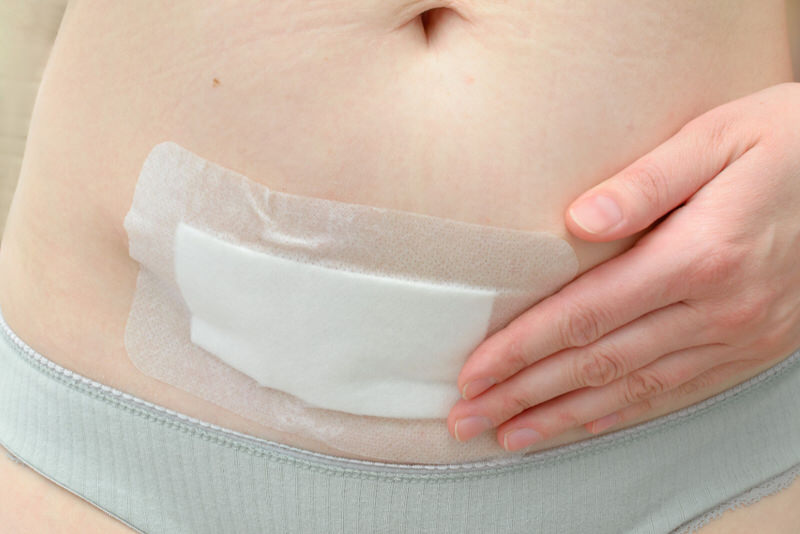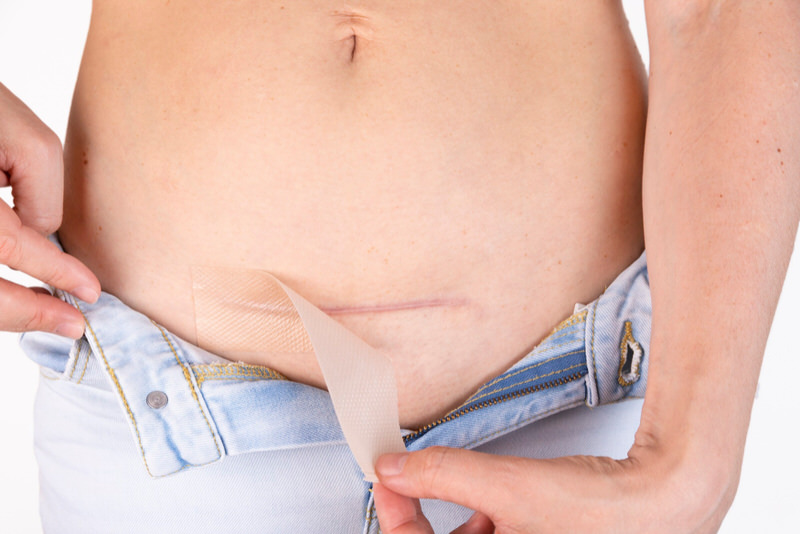Regardless of the type of your c-section incision, it should feel better by 2 weeks but would completely heal between 6 weeks up to 3 months. If properly cleaned regularly, your scar should not smell bad or look red. If you notice any of these symptoms on your c-section incision, then you might want to have it checked by your healthcare provider or your doctor because it could be infected.
Risk factors for c-section infections
Reason for c-section
Emergency c-sections are at higher risk of getting an infection because there is less preparation time than a planned c-section delivery where all possible complications for the operation have been considered and prepared for.
There are multiple reasons why your doctor would call for an emergency c-section. Most of the time, it’s because the mother or the baby’s safety is in the line.
Obesity
Having a high ratio of body fat to muscle puts strain on your bones and your internal organs.
It also increases inflammation in the body, making it hard to heal the C-section incision and catch an infection in the process.
Diabetes
A person with type 2 diabetes heals open wounds slowly and may also cause recurring infections.
This is because elevated glucose levels make it harder for the body to heal.
Previous C-section
Most doctors don’t recommend vaginal birth after cesarean (VBAC) for moms who’ve had two or more c-sections.
That’s because the risk of uterine rupture rises with each surgery.
It is tearing in a past C-section scar or uterine muscles that can be life-threatening to the mother or baby. The uterine rupture might cause heavy bleeding that leads to blood transfusion.
Signs of infection for c-section
Even after giving birth, you should still have a regular appointment with your doctor for them to monitor your healing progress.
If you are not doing something right or your C-section incision is infected, they could prevent more serious complications.
Having experienced that myself, I know that a lot is going on after giving birth, and sometimes the last thing you focus on is yourself.
Here are some signs that your C-section incision needs to be checked for possible infection:
- Redness – You might think, but this is a wound, and wounds are normally reddish, but no, this is a different kind of redness. It is usually red and swollen, and if your incision is properly clean or healing, then it should not be any of those.
- Swelling – Again, wounds are still normally a little swollen, but if the swelling around the incision looks a little too much and it would hurt if you touch it, then you might want to have your c-section checked to prevent further complications or infection.
- Leaking fluid from the wound – This usually comes with abnormal swelling and sometimes even with a little bad smell. These wounds are usually covered most of the time, and no air is helping the incision heal faster.
- Fever – It’s sometimes hard to point out the reason for a fever. Unless you have colds or flu, you won’t think right away that your fever is being caused by your wound. If at least 2 signs above (redness, swelling, fluid from wound) or all 3 are present in your c-section incision, then most probably your fever is because it has caught an infection.
- Abdominal pain – Once the infection starts to spread, you will not only feel the pain from your incision area but also within your abdominal area. See your doctor as soon as possible to prevent further complications.
- Foul-smelling vaginal discharge – Vaginal discharges are normal, but certain types of discharge can indicate an infection. Abnormal discharge may be yellow or green, chunky in consistency, or foul-smelling. Different types of vaginal discharge are categorized based on their color and consistency, it is best to take a photo to be as accurate as possible when consulting your doctor or healthcare provider.
How to prevent a c-section incision infection

An infection is the last thing we want after just going through pregnancy for 9 months and major surgery to safely deliver your precious baby. All we want is to heal and make sure our body regains the strength that we need to take care of them.
Here is a list of some things you could do to make sure your C-section wound heals as soon as your body would allow it:
- Keep it clean – Clean your wound and change the wound dressings regularly, make sure that you wash it with soap and rinse it with water properly, and follow the wound care instructions given by your doctor. If you have questions, don’t hesitate to give them a call.
- Follow medication instructions – If you have been advised to take antibiotics to prevent infection, don’t skip doses or stop using them until you have finished the entire course of treatment. This is particularly important because the C-section incision wound is in a part of your body that is always covered, which makes it harder to dry or heal faster.
- Wear loose clothes – It would be harder for your wound to heal if it is being pressed or stretched too much. Just like any wound, you have to prevent unnecessary pressure as much as possible to allow the wound to heal.
- Mind your movements – You will be advised to move but not too much. If you are planning to breastfeed your baby, make sure that you are seeking help whenever you need it, and you don’t force yourself to lift your baby even if it puts too much pressure on your wound. Healing your c-section wound as soon as your body would allow it means you can resume your normal movements and activities, including taking care of your baby better.
Conclusion
The postpartum period is probably one of the most challenging times as a mother, and we just want to recover and feel ourselves again.
This, however, can only be possible if we make it our priority to take the actual time needed to heal properly and regain the much-needed strength physically, mentally, and emotionally.
If in doubt, don’t hesitate to call your doctor to get professional advice.
We hope that this article helped you in any way. Always feel free to share your personal experiences and thoughts in our comment section below.


